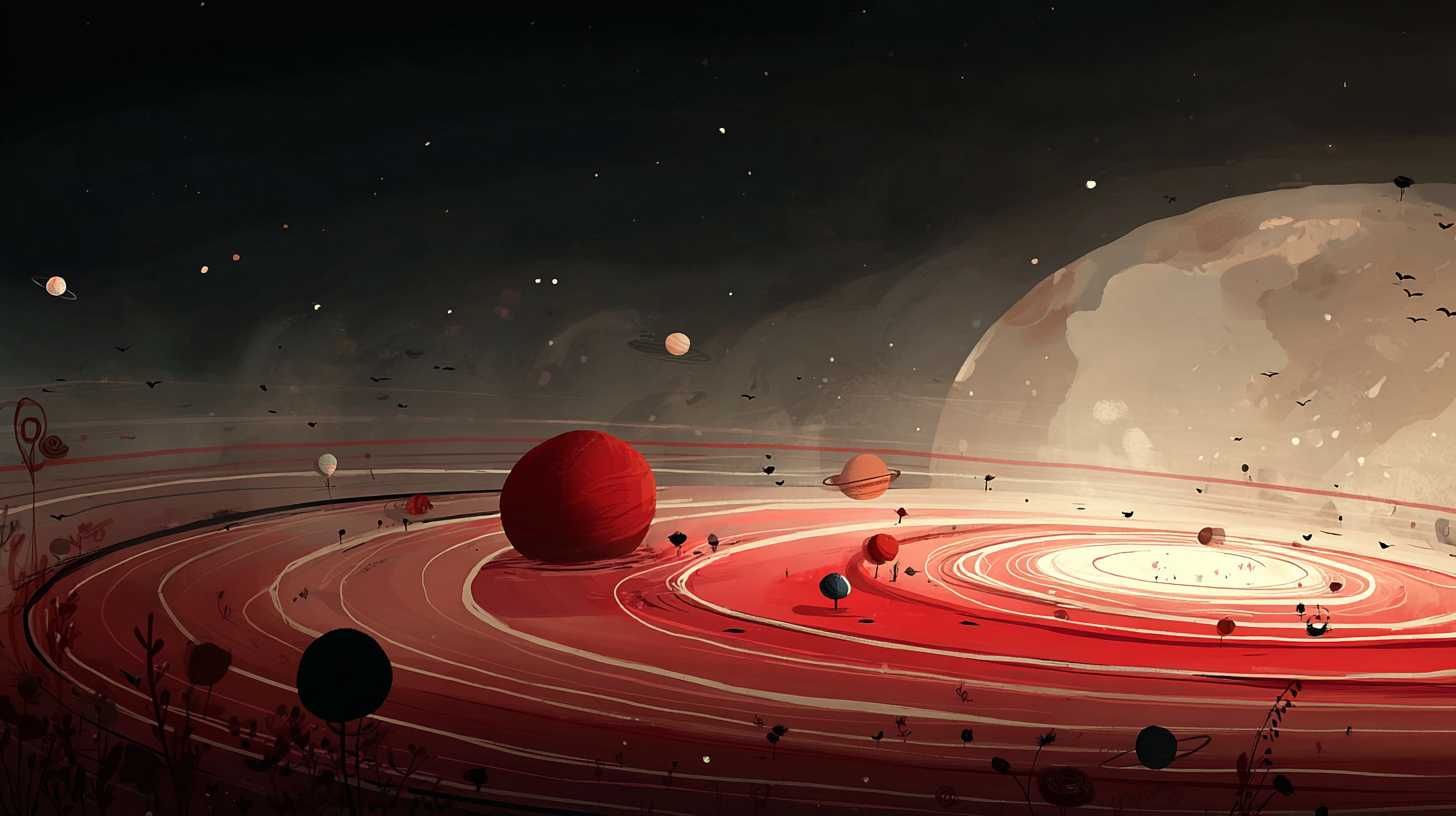A planet is a big round object that goes around the Sun.
planet は「太陽のまわりを回っている大きな星」のことです。
以下は英単語 “planet” に関するストーリー型学習コンテンツです。まずは大枠の意味を理解して最後の文章で確認しましょう。
主な意味(main meaning)
| 品詞 | 意味 | 発音記号 | 英語例文 |
|---|---|---|---|
| 名詞 (noun) | 太陽の周りを回る天体(惑星) | /ˈplæn.ɪt/ | Earth is the third planet from the Sun. |
語源(etymology)
語源:ギリシャ語 planētēs 「さまよう者(wanderer)」から。
核イメージ:「動き回る星」。古代人は夜空の星の中で動いて見える天体を「惑星」と呼びました。
類義語(synonyms)
| 類義語 | 意味 | 例文 |
|---|---|---|
| world | 世界、地球 | People dream of traveling to another world. |
| globe | 地球、球体 | The globe is warming because of climate change. |
| celestial body | 天体 | The telescope allows us to see distant celestial bodies. |
| sphere | 球体、天体 | The Earth is almost a perfect sphere. |
反義語(antonyms)
| 反義語 | 意味 | 例文 |
|---|---|---|
| star | 恒星 | The Sun is not a planet but a star. |
| asteroid | 小惑星 | An asteroid is smaller than a planet. |
コロケーション(collocations)
| コロケーション | 例文 |
|---|---|
| distant planet | Scientists discovered a distant planet outside our solar system. |
| rocky planet | Earth is a rocky planet with land and water. |
| gas planet | Jupiter is known as a gas planet. |
| planet Earth | We must take care of planet Earth. |
2項表現(binomials)
| 2項表現 | 例文 |
|---|---|
| stars and planets | Children enjoy learning about stars and planets. |
| Earth and Mars | Earth and Mars are often compared by scientists. |
英語ストーリー(english story)
Tom worked at a science museum. One day, his boss asked him to prepare a new exhibition about space. Tom thought carefully about how to explain the idea of a planet to visitors. He knew that a planet is a big round object that goes around a star, like the Earth around the Sun.
He started by comparing Earth with other worlds (類義語: world). He explained that Earth is unique because it has water and life. Then he used a globe (類義語: globe) to show visitors the shape of Earth.
Later, Tom showed pictures of different celestial bodies (類義語: celestial body) such as the Moon and distant planets. He also explained that Earth is almost a perfect sphere (類義語: sphere).
To help visitors understand better, Tom compared planets with their opposites. He said, “The Sun is not a planet but a star (反義語: star). Also, small objects like asteroids are different from planets. An asteroid (反義語: asteroid) is much smaller.”
He also taught common expressions about planets. For example, he described Jupiter as a gas planet (コロケーション), while Earth is a rocky planet (コロケーション). He reminded everyone that “We must protect planet Earth (コロケーション) for future generations.”
In the last part of his talk, he showed a short video about stars and planets (2項表現). The children became very excited and asked questions about Earth and Mars (2項表現).
Tom was happy because his explanation was clear and easy to understand. At the end, a boy said, “I want to become a scientist and travel to another world one day.” Tom smiled and thought that teaching about space could inspire the future.
和訳
トムは科学博物館で働いていました。ある日、上司から宇宙についての新しい展示を準備するように頼まれました。トムはどうやって「planet(惑星)」を来館者に説明するかを考えました。惑星とは、太陽のような星のまわりを回る大きな丸い天体のことだと知っていました。
彼はまず、地球とほかの**world(世界)**を比べました。地球は水と生命がある特別な惑星だと説明しました。その後、**globe(地球儀)**を使って、地球の形を見せました。
次にトムは、月や遠い惑星などの**celestial bodies(天体)の写真を見せました。そして地球がほぼ完全なsphere(球体)**であることを説明しました。
さらに、惑星とその反対の存在を比較しました。彼は「太陽は惑星ではなく**star(恒星)**です。また、小さな天体である小惑星は惑星とは違います。**asteroid(小惑星)**はずっと小さいのです」と説明しました。
トムはまた、惑星に関するよく使う表現も教えました。たとえば、木星は**gas planet(ガス惑星)で、地球はrocky planet(岩石惑星)です。そして「未来のためにplanet Earth(地球)**を守らなければなりません」と伝えました。
最後に、**stars and planets(星と惑星)**についての短い映像を見せました。子どもたちはとても興奮し、「Earth and Mars(地球と火星)」についてたくさん質問しました。
トムは説明が分かりやすくできたので嬉しくなりました。最後にある少年が「いつか科学者になって、ほかの**world(世界)**へ行きたい」と言いました。トムは微笑み、宇宙について教えることが未来を動かすかもしれないと感じました。
Q&A
Q: planet と world の違いは何ですか?
A: planet は科学的な意味で「惑星」を指します。
一方 world は「世界」や「人間社会」を含む意味もあり、詩的・感情的に「地球」や「別の世界」を表すときに使います。
Q: planet と globe の違いは何ですか?
A: planet は宇宙に存在する天体そのものを指します。
globe は「球体」や「地球儀」の意味が強く、地球の形や地図を表すときに使います。
Q: planet と celestial body の違いは何ですか?
A: planet は「惑星」という特定の種類の天体を指します。
celestial body は「天体」という広い意味で、惑星のほかに星、月、小惑星なども含みます。
Q: planet と sphere の違いは何ですか?
A: planet は太陽を回る天体という科学的なカテゴリーです。
sphere は「球体」という形を表す言葉で、地球や惑星などの丸い形を説明するときに使います。
Q: planet と star の違いは何ですか?
A: planet は自分で光らず、恒星の光を反射して見える天体です。
star は自分で光や熱を出す天体で、太陽もその一つです。
Q: planet と asteroid の違いは何ですか?
A: planet は大きくて丸い天体で、重力によって形が整っています。
asteroid は小さくて形が不規則な天体で、多くは火星と木星の間に存在します。
Q: planet Earth と rocky planet の違いは何ですか?
A: planet Earth は「地球」という特定の惑星を強調する表現です。
rocky planet は「岩石惑星」という種類を表す言葉で、水星・金星・地球・火星をまとめて説明するときに使います。
Q: planet と gas planet の違いは何ですか?
A: planet は惑星全般を指す言葉です。
gas planet はその中の一種で、木星や土星のように主にガスでできた巨大惑星を指します。
Q: stars and planets という表現での planet の役割は何ですか?
A: この表現では、宇宙に見える天体を2種類に分けています。
stars は自分で光る天体、planets は光を反射して見える天体です。
Q: Earth and Mars という表現での planet の使い方は?
A: Earth も Mars も惑星ですが、この表現は比較や対照のために使われます。
「地球と火星はどう違うのか」という科学的議論でよく登場します。
こうして違いを整理すると、planet は科学的にとても限定された意味を持ち、それぞれの単語が「形」「種類」「範囲」「比喩的表現」などの違いで使い分けられることが分かります。



コメント